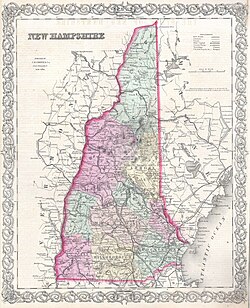
New Hampshire’s history of human migration reflects centuries of dynamic social, economic, and cultural transitions that have shaped the state’s identity. Long before European contact, the region was home to the Abenaki and other indigenous communities, whose presence spanned millennia and was characterized by deep ties to the land’s abundant natural resources. Starting in the 17th century, waves of European settlement—initially driven by religious freedom and economic opportunity—brought Puritans, Scots-Irish, and other groups seeking to establish new lives along the New England coast and beyond. Enslaved Africans also arrived as part of the forced diaspora that undergirded colonial economies, further diversifying the region’s emerging population.
Over time, New Hampshire’s industrial growth drew substantial numbers of immigrants from Ireland, French Canada, and later from Southern and Eastern Europe. Families sought factory and mill work in places like Manchester and Nashua, creating culturally distinct neighborhoods that helped define the character of these cities. Modern resettlement programs, especially in the aftermath of global conflicts, continue to attract refugees and newcomers from Southeast Asia, Latin America, Africa, and the Caribbean, ensuring that the state’s demographic profile remains in constant evolution.
Research your ancestors on MyHeritage
List of New Hampshire historic migration routesList of New Hampshire historic migration routes
| Time Period | Ethnic Group | Origin Location | Arrival Location | Motivating Factors |
|---|---|---|---|---|
| c. 10,000 BCE – 1600s (Pre-Contact) | Abenaki and other Algonquian-speaking peoples | Indigenous homelands in the Northeastern Woodlands (Wabanaki Confederacy region) | Throughout present-day New Hampshire (river valleys, seacoast, and interior) | Seasonal movement tied to hunting, fishing, and gathering; ancestral territories |
| 1620s – 1660s | English Puritans | Primarily from southeastern England | Seacoast settlements (e.g., Portsmouth, Dover) | Religious freedom (escaping persecution), economic opportunities in fishing, trading, and timber |
| 1719 – 1750s | Scots-Irish (Ulster Scots) | Province of Ulster in Ireland | Early inland towns (e.g., Londonderry, Windham) | Religious freedom, escaping high rents and economic hardship, search for farmland |
| 1720s – 1780s | African (Enslaved and Free) | Forced migration from Africa via the Atlantic slave trade and secondary migration from Southern Colonies | Colonial towns, with small communities in Portsmouth, Exeter, etc. | Enslavement and forced labor; later, some free Black individuals seeking better conditions in the North |
| 1770s – 1820s | English, Scots, and other British Isles settlers (second and third generation) | Older New England colonies (Massachusetts, Connecticut) and direct from Britain | Northern and western frontier areas of New Hampshire | Access to new farmland, westward expansion, family ties |
| 1820s – 1860s | Irish (Catholic) | Ireland (particularly during and after the Great Famine, 1840s) | Urban centers near developing mills (e.g., Manchester, Nashua) | Industrial jobs, escape from famine and poor economic conditions |
| 1840s – 1920s | French Canadians[1] | Quebec and the Maritime Provinces | Mill towns along major rivers (e.g., Manchester, Berlin, Nashua) | Employment in textile and paper mills, economic opportunity, proximity to Canadian border |
| Late 1800s – early 1900s | Polish, Greek, Italian, Lebanese, and other European/Mediterranean groups | Various regions of Eastern and Southern Europe, Middle East | Growing industrial and manufacturing hubs (Manchester, Nashua, Dover) | Factory and mill jobs, escape from political strife, better wages, chain migration through family networks |
| Early 1900s – 1930s | Swedish, Norwegian, Finnish (Scandinavian) | Scandinavia | Agricultural communities, timber and paper mill towns in northern New Hampshire | Economic opportunities in lumber, papermaking, and farming |
| 1970s – 1980s | Southeast Asian refugees (Vietnamese, Laotian, Cambodian, Hmong) | Southeast Asia (post-Vietnam War diaspora) | Urban areas such as Manchester, Concord | Refugee resettlement programs, escape from war and political turmoil, family reunification |
| Late 20th century – present | Latin American (Mexican, Central & South American), African, Caribbean, and others | Various countries in Latin America, Africa, and the Caribbean | Statewide, with concentrations in larger cities (Manchester, Nashua, Concord) | Economic opportunity, family reunification, political asylum |
References
- ↑ Manchester, New Hampshire. The French-Canadian Genealogist

